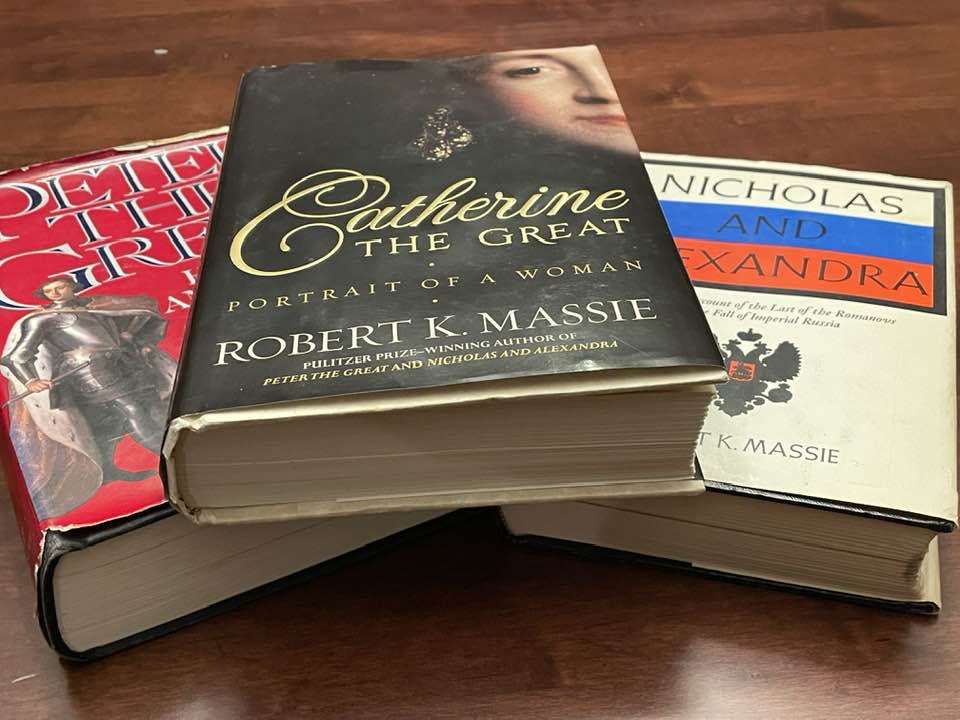DECEMBER 3, 2022 – I’m currently reading Robert Massie’s acclaimed biography of Catherine the Great, Empress of all the Russias. I’d first read it a decade ago, and as I’ve discovered with multiple books lately—including other Massie masterpieces: Peter the Great and Nicholas and Alexandra—a second reading heightens retention as well as comprehension.
I read lots of history, and what strikes me about historical writing is the near impossibility of avoiding bias. Objectivity is most challenging when past actions and perspectives are judged by the gauge of modern norms—especially since “modern norms” are themselves rather fluid.
When Massie introduces the lineage of Gregory Orlov, one of Catherine’s lovers and a key figure in her ascension to power, he describes a scene wherein the hero’s grandfather was caught up in a bloody purge of the Streltsy (special Kremlin guards established under the reign of Ivan the Terrible) by Peter the Great. To rid himself of the perceived threat posed by the guards, Peter called for their heads. When Orlov (the elder) was led to the execution spot on Red Square, he kicked a severed head to the side and shouted, “I need to make room for myself.” Peter was so impressed by the condemned man’s “contempt for death,” as Massie described it, the Tsar not only pardoned Orlov but promoted him.
“[K]icked a severed head to the side.” As I pictured the scene—bloody body parts strewn over the execution site—and Peter’s arbitrariness, I recalled a college paper I wrote about Peter. The question was whether Peter was “an enlightened Westerner or an Eastern despot.” Of course, I hedged my bets and said he was both, for which argument I was assigned the equivalent of a “B” by a very tough-grading prof. As I reflect on my undergraduate callowness, however, I remember my thought process—influenced exclusively by late 20th century, liberal Western mores.
But back to Catherine—née “Sophia.” Massie relied heavily on Catherine’s own memoirs, from which he quotes extensively. My sequel project will be to track them down and study them. They’re remarkably lucid and accessible to the modern eye in both style and perspective. In fact, she was for a time, anyway, quite enlightened in outlook, at least by the standards of Voltaire, whose writings she admired—again, for a time—and whose views we still deem modern and liberal. As Catherine faced the realities of governing a land as vast, diverse, and fractious as the Russian Empire in the late 18th century, she became less liberal and more autocratic in mentality and practice.
What I find compelling about Massie’s biography of Catherine is how fully he brings her and supporting actors to life. He takes people from their stylized portrayals on canvas and gets “inside their heads” as well as behind their actions. Like leading figures of any age, Catherine and the personae dramatis of her court and reign were a combination of good and bad, ugly and beautiful—by the measures of 18th century Europe and the standards of our own day and culture.
Massie’s biography of Catherine leaves to the reader to decide what Putin thinks of his predecessor autocrat . . . and what Catherine would’ve thought of him.
(Remember to subscribe to this blog and receive notifications of new posts by email.)
© 2022 by Eric Nilsson

2 Comments
This is one of my favorite books that I have ever read.
I’ve read it twice, Linnea, and I’m not reading Robert Massie’s biography of Peter the Great for the THIRD time! (I’ve read his biography of Nicholas and Alexandra three times already.). What I find so fascinating about the Catherine biography is what it reveals about the PROCESS of historical research, synthesis and exposition. The real challenge for the reader, I think, is to figure out what prism or prisms should be used to assess the characters of a distant era. Catherine is a particularly interesting person because of her extensive knowledge of and affinity for “things Western” while trying to effect change in a vast, “eastern” land, bound by very different traditions. Then came the French Revolution–or rather, the French Revolution off the rails–which threw Catherine for a loop and triggered a sharp, emotional reaction on her part. All very, very interesting. — Eric
Comments are closed.